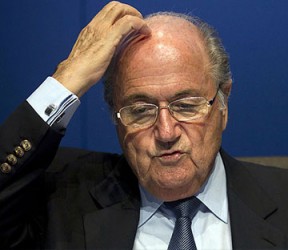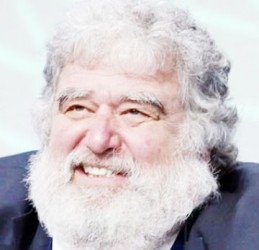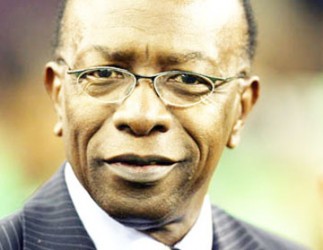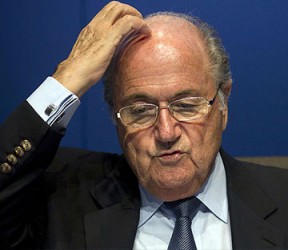LONDON, (Reuters) – In less than a week, the public face of FIFA has gone from something resembling an old-style Communist Party rally, with a defiant Sepp Blatter fronting ranks of flag-bearing youths, to what looks more like a scene from “Reservoir Dogs”.
Despite dawn arrests and U.S. indictments of FIFA men past and present, Blatter opened world soccer’s annual congress on a high last week, knowing he was going to be re-elected president for a fifth term.

Now he is heading for the exit, and as U.S. prosecutors dig into what they say is a $150 million bribery racket going back years, Blatter’s former top FIFA aides look like Quentin Tarantino movie characters pointing guns at each other in a Mexican stand-off.
After secretly pleading guilty to 10 criminal counts in agreement with U.S. prosecutors, former FIFA executive committee member Chuck Blazer told a U.S. judge that he and others took bribes in connection with the 1998 and 2010 World Cups, among other major tournaments.
That confession from two years ago was made public on Wednesday. Blazer’s testimony referred to, but did not name, “other persons” and “others on the FIFA executive committee” who had agreed with him to accept or facilitate bribes.
Blazer, a corpulent 70-year-old with a curly white beard that makes him look like Santa Claus, is now in hospital with cancer and unable to speak. But in his pomp he chronicled his globe-trotting activities to spread the good word for FIFA on his blog, which now seems inactive.
He is pictured with Nelson Mandela and soccer legends George Best and Pele. He can also be seen with an exotic dancer, a parrot, and dressed up like a pirate.
The New York Daily News reported last year that he kept an apartment in the city mainly for his cats and needed a fleet of mobility scooters to get about.
In the other corner is Jack Warner, a former FIFA vice president from Trinidad and Tobago who is accused of soliciting bribes worth millions and has been charged with offences including racketeering and bribery. Last week he described himself as innocent and devoted “to improving the lot of every citizen of every creed and race in this nation”.
On Wednesday, he appeared on television in Trinidad and Tobago, saying he feared for his life, but vowing to reveal everything he knows about corruption at FIFA.
He said he had documents relating to financial dealings with FIFA, some of which are being investigated by U.S. authorities, as well as papers linking FIFA with the 2010 Trinidad and Tobago parliamentary elections.
ANGRY FANS
It all presents a spectacle that has angered many football fans and bemused outside observers.

“What a genuinely nice bunch of guys they are,” said Simon Chadwick, professor of sports business strategy at Britain’s Coventry University. “They hang out with each other for years and now they are trying to take each other down.”
While the charges levelled by the U.S. Attorney General, the FBI and the U.S. Internal Revenue Service are serious, the scandal has much about it that is absurd.
Warner was briefly arrested last week in connection with the FIFA affair but left detention in an ambulance. He was later widely pictured with a garland around his neck, waving a flag and addressing a political rally. He also appeared to fall for a spoof article in The Onion satirical website, which said a panicked FIFA had awarded the World Cup to the United States this summer.
Chadwick pointed out that just hours after Interpol issued “red notices” listing Warner among a number of wanted former soccer officials whose whereabouts should be reported to authorities, the Trinidadian could be seen on television threatening to tell all.
The FIFA furore, focussing on the governance of the world’s most popular sport, has turned into what some see as a massive series of publicity opportunities for all concerned – investigators, prosecutors, commentators and media.
“It has oversimplified the seriousness of what’s happening,” said Chadwick.
Behind the hype, the battle lines between the old soccer powers in the West, determined that Blatter must go, and the emerging soccer nations in Africa and Asia grateful for his largesse, mirror what is happening on the world political stage, where relations between industrial economies and emerging states are shifting.

“Football has become a football. It’s no longer about a bunch of guys in Switzerland,” Chadwick told Reuters. “It’s no longer about Sepp and his mates, but what the world will look like in 10 years time.”
Where once Sepp and his mates presented a united front, taking decisions on behalf of world soccer in a room lined with black granite in the depths of FIFA’s Zurich headquarters, their future now looks under threat.
Blatter remains in his post until a new FIFA president can be elected, probably not before December at the earliest, but there have been calls for him go at once.
In addition to the acres of newsprint and miles of video, however, Blatter’s legacy will live on, immortalised on screen, after a fashion.
“United Passions”, a FIFA-financed feature starring Tim Roth as Blatter, has been panned by the critics, but one line from the film’s trailer seems destined to live on.
“Blatter is apparently good at finding money.”










